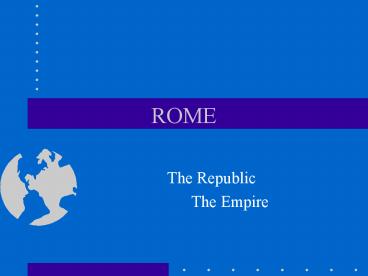ROME
1 / 23
Title: ROME
1
ROME
- The Republic
- The Empire
2
The Origins of Rome The Myth
- Romulus and Remus
3
The Truth (as we know it)
- Earliest prehistoric settlements (1000
B.C.) - Latin's shepherds
- Greek colonies in Italy
- Etruscans settlements
- Founded on the seven hills of Rome
4
Geography was important to Roman Success
- Rome was midway between the Alps and Sicily
- Rome was on a river near the Sea but not too near
- Rome was midway between Spain and the Middle East
5
Religions
- Polythestic
- Many early gods had no names but
charged with taking care of daily things - Took signs from nature
6
Social Organization
- Family
- Gravitas (seri-ousness)
- Role of fathers was important
- Role of women was less important
- Classes
- Patricians - upper class
- Plebeians- lower class
7
Rome achieved a balanced government.
- Monarchy-consuls
- Aristocracy-Senate
- Democracy-Election of Senators
- Dictatorship-crisis times
8
The plebeians made progress toward equality.
- Tribunes of the Plebs
- 10 elected officials to represent the plebeians
in the Senate - Were granted veto power
- Twelve tables-codified the laws
- Citizens Assemblies
- More democratic form of government
- All adult, Roman males could attend and vote
9
Punic Wars
- Between Carthage and Rome
- Three separate wars
- 1st war -Rome built a navy
- 2nd war-Hannibal crossed the Alps with elephants
- 3rd war- Rome destroys Carthage
10
Rome was hurt by the Punic Wars
- Many, many deaths
- Farms destroyed which led to proletariat
- Rich corrupted by power
- Slavery widespread
- Political arguments settled by bloodshed
11
Julius Caesar, Pompey, and Crassus formed the
First Triumverate but it did not last.
- Crassus died
- Pompey Caesars rival
- Senate ordered Caesar to return to Rome
- Caesar crossed the Rubicon River with loyal
troops and became dictator of Rome
12
44 B.C. Caesar appointed dictator and tried to
reform the government.
- Granted citizenship to the provinces outside of
Italy - Senate enlarged to 900 men
- Landowners had to use free laborers for 1/3 of
their work force - Public works program
- Used colonies in Spain, France, etc. to provide
land for landless poor - Designed a new,accurate calendar
13
Caesars Death
- Conspiracy
- Brutus and Cassius pardoned for supporting Pompey
- They killed Caesar for his ambition and disregard
for the Roman Constitution - Thought they had saved the Roman Republic but it
was dead
14
Now Rome is an empire not a republic.
- The Senate and the Assembly continued to meet
- Octavian (emperor) continued to address the
Senate - Senate played along
- Octavian ruled as a
dictator for 41 years
15
Succession never solved in Rome
- It was never determined how the next emperor
would be decided in Rome when the current emperor
died. - After the death of the emperor, Rome generally
went into a time of violence as different
factions made their choices clear.
16
Toward the end of the republic a new religion was
born.
- Jesus taught through
- Parables (stories with a lesson embedded in them)
- Disciples ( his chosen 12 men who spread his word
after his death)
17
Many of the Christian teachings collided with the
Roman ideas.
- Religious ceremonies - Christians did not attend
pagan ceremonies. - Fighting - Christians would not fight.
- Worshipping the emperor - Christians only
worshipped God and Jesus.
18
Consequently the Romans persecuted the Christians.
19
Time of Crisis Crisis of the Third Century
- Economic Problems - three sources of prosperity
ended (trade, plunder, farms) - Military Problems - Goths over ran legions,
soldiers fought for money not patriotism - Political Decay - officials were no longer loyal
to Rome
20
Barbarians Invasions
- Ostrogoths, Visigoths, Franks, Angles, Saxons,
Burgundians, Lombards, Vandals - Visogoths outside of Rome
- (Alaric)
21
Many historians have theories explaining why Rome
fell...
- Political
- Social
- Economic
- Military
22
Immediate cause of the fall of Rome was...
- Pressure from Huns and invasions from the German
tribes - The Hun threatened not only the Roman Empire, but
all Germanic tribes as well - Attila sacked 70 cities in Rome
- Attila met with Leo I (the pope) and stopped
short of destroying Rome completely
23
Fall of Rome
- Conquest by barbarians
- led to the sack of Rome.





























![READ [PDF] Rome and Attila: Rome's Greatest Enemy (The Fall of the Roman Empire)](https://s3.amazonaws.com/images.powershow.com/10107502.th0.jpg?_=20240824095)
![[READ DOWNLOAD] Rome and Attila: Rome's Greatest Enemy (The Fall of the Roman Empire Book](https://s3.amazonaws.com/images.powershow.com/10107503.th0.jpg?_=20240824096)
